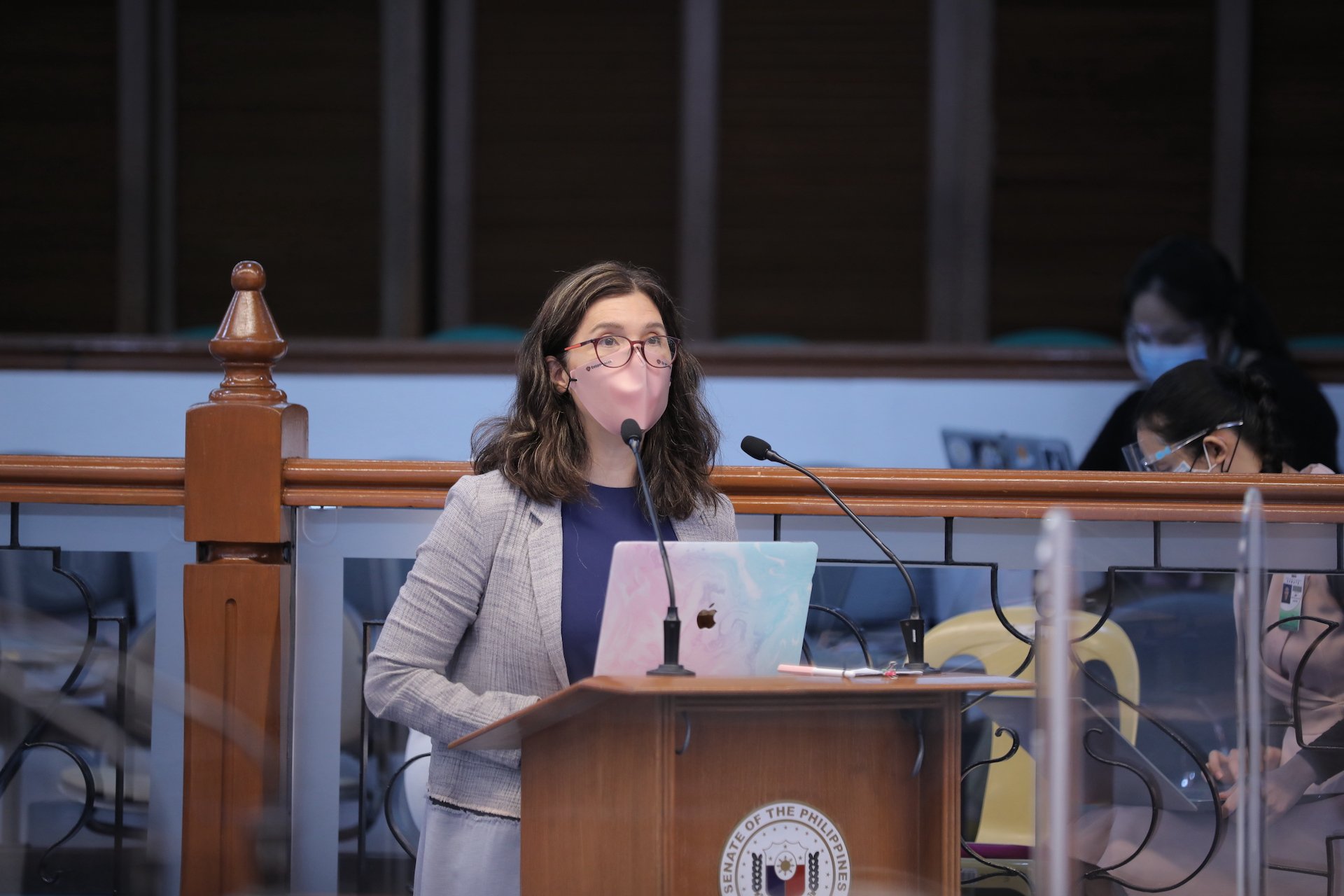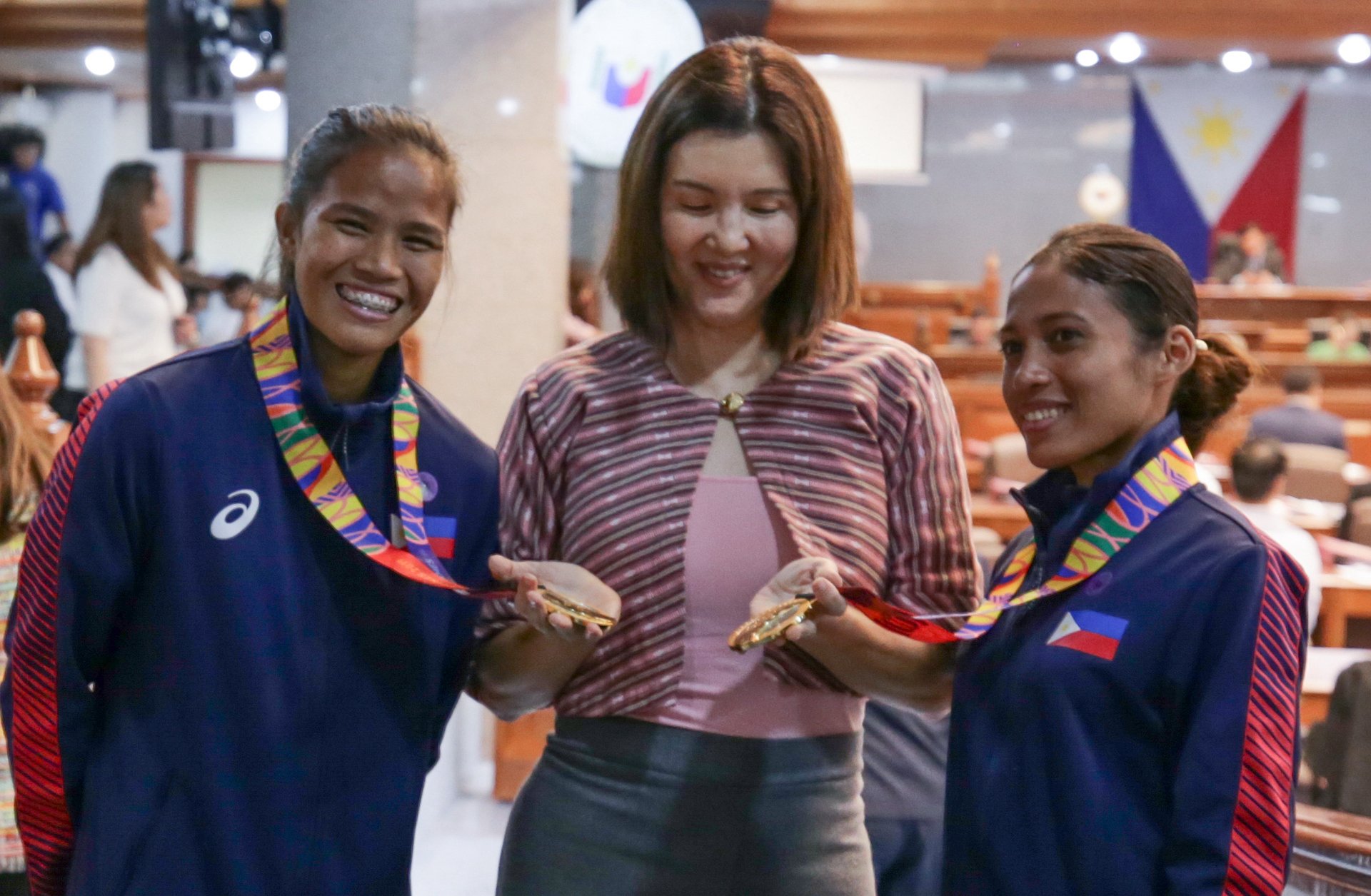I write this blog on the occasion of Dr. Jose Rizal’s 153rd birthday. Read More
Category: Laws
Donde estas? En el medio del mar.
Where are you? In the middle of the sea. Read More
Earth Day
I am so proud to wear the Philippine map on my face for Earth Day. Read More
Victory in the Supreme Court: Reproductive Health Law is Constitutional
By a unanimous decision, the Supreme Court declared the Reproductive Health Law as constitutional. Read More
Legislative Agenda for 2014
On the first Saturday of the year, my amazing Senate legal team indulged me and let me buy them a cup of coffee each Read More
A Quiet Day in the Senate: Family Code Amendments and A1H1 Vaccination
September 9, 2010
Thursdays are usually quiet in the Senate. It is not a session day, but there are hearings in the morning and the afternoon.
I had two things going on that day. One was the hearing I chaired on the Committee on Women, Youth and Family Relations with respect to the amendment of various provisions of the Family Code.
Atty. Mel Sta. Maria, a Professor in the Ateneo Law School, shared his expertise on Family law.
My hearings are usually quiet. Especially when we dissect provisions of the law, it can get a bit legalistic, perhaps boring for some. But Family law, is a very interesting subject matter because it defines our rights as persons and our relationships with each other – marriages, parent and child relations, siblings etc. It was one of my favorite subjects as a law student. So revisiting it now as a law maker, was something else. I didn’t have the same nervousness and apprehensions I did as a student or someone taking the bar exam. It was actually fun, discussing the various provisions of the law, analyzing their flaws, going through the various views of legal luminaries, and considering the possible amendments.
Some of the provision of the Family Code that we reviewed were:
– Art. 73. On the right of a spouse to exercise any legitimate profession.
– Art. 63. The name a married woman may use
– Art. 111. The right of a spouse to encumber their exclusive party.
– Art. 236. Liability of the parents for damages caused by their children between 18 and 21 who live with them.
-Art 26. Capacity of a Filipino to remarry if her foreign spouse obtains a divorce.
-Art 75. Establishing the property regime, when there is no marriage settlement or it is void.
We had a lively discussion on all of the above provisions. We suspended the hearing until further notice .
In the room across the hall, we had another activity going on… the free vaccination against AH1NI for senate employees and selected groups, a joint project of my office and the Department of Health. 
The Philippine Flag in the light of the Hijacking Incident
After the recent hijacking incident involving a military official who hijacked a bus load of foreign nationals and some Filipinos, another public uproar emerged when his casket was draped with the Philippine flag. I had twitted that I was of the view that this was inappropriate.
The Philippine Daily Inquirer quoted the Chinese embassy’s statement:
“The person who deserves a national flag at the funeral should be someone of heroism, decency and integrity, not someone who inflicts atrocity on innocent lives. This is nothing but a smear on the dignity of the Philippine national flag.”
PDI further quoted Director Leocadio Santiago Jr., the chief of the National Capital Region Police Office saying that they did not give the Mendoza family the flag, but that if the family draped his coffin with a flag, they could not forbid it.
Section 2 of Republic Act No. 8491 otherwise known as the “Flag and Heraldic Code of the Philippines” states that:
“Reverence and respect shall at all times be accorded the flag, the anthem, and other national symbols which embody the national ideals and traditions xxx”
Sec 24 of the said law further states:
“The flag may be used to cover the caskets of the honored dead of the military xxx”
The respect that must be accorded our Philippine flag, which the law states “embodies our national ideals and traditions” is blatantly disregarded when the flag is draped over the casket of a person who caused the loss of lives of innocent people. To do so would be a distortion of our ideals and values as a people. Likewise, Captatin Mendoza, cannot be considered an honored dead of the military. Consequently, the Philippine flag should not have been draped over his casket.
London Part I: Women Power thru Pinay OFWs and the Queens of England
After my conference in Geneva, I flew to London. I had requested the Philippine Embassy to set-up a dialogue with the Pinay OFWs, particularly the nurses. I have been working on our problem brought about the migration of our health professionals and knowing that we had a large number of nurses in the UK, I wanted to meet them.
Before the meeting, I chatted with Ambassador Lagdameo who is an old friend of my mom and dad. He knew my parents when they were still studying in the University of Michigan and actually gave me my very first present when I was born! Imagine that. It was a delight chatting with him. I asked him and Con Gen de Vega about their visit to the queen where the ambassador presented his credentials and they had to bow and curtsy 3x in keeping with protocol.
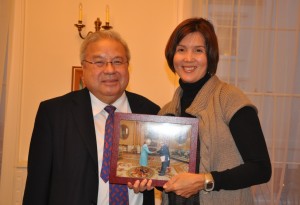
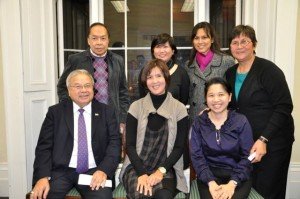
I was delighted to be among such an empowered group of Pinays! Among others, the group included a nurse, teacher, businesswomen, solicitor, domestic worker, chef and urban planner.
We had a lively discussion at the Embassy. Ambassador Lagdameo and Consul General Tess de Vega welcomed everyone. I began by giving the women a background of the issues affecting women and why I believe legislation and policies still need to be improved. I talked to them about the Magna Carta of Women. I also mentioned the Millennium Development Goals and the salary standardization law (see my previous blog on the discrepancy between the salaries men and women. I explained my work in the Inter-Parliamentary Union (IPU), where I currently am the President of the Women Parliamentarians.
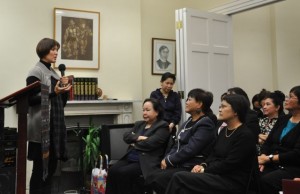
For this talk, I focused on migration issues and how migration affects both the OFWs and the families left behind. I emphasized the need to create more programs directed at the social impact on OFWs and their families.
After my talk, we had an open forum to give the women a chance to air their views and concerns. Many of them spoke of the long hours they endured to send money back home. Many worked 2-3 jobs! But despite the long hours, they felt rewarded and fulfilled in their ability to improve their standards of living and provide for their families.
They also spoke of the difficulty of being away from their families, the frustration of not getting the support and understanding they needed from loved ones back home. Many nodded their head, when one woman spoke about the despair of working so hard and yet feeling unappreciated.
They were a hardy happy set of women, confident about the lives they made for themselves in the UK. They spoke of improving their support system for newcomers to help them adjust to the lifestyle in the UK and the need to encourage Pinays to get better by getting a better education.
The next day I went to the Financial Learning Campaign sponsored by the Central Bank and the Philippine Embassy. I think this is a great program and committed my support for continuing financial literacy programs for the OFWs and their families back home.
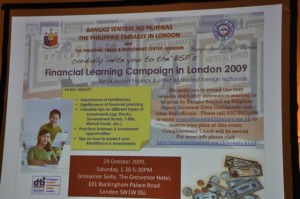
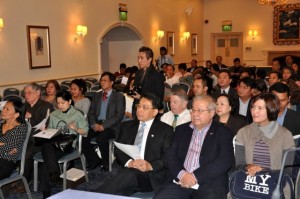
In between those meetings, I was able to visit a few historic sites including the Tower of London and West Minister Abbey. I am an enthusiastic student of history, including English history. And I was thrilled to visit the places, I had only read about in the past. I have always believed that we can learn a lot if we look back into history.

Suffice it to say, at a time where women were subservient to men, England had a succession of Queens that ruled the land. Each of these Queens have their own stories to tell. I’ve been reading about the lives of queens, including Queen Katherine of Aragon (first wife of King Henry VIII), Queen Mary and her sister Queen Elizabeth (daughters of King Henry VIII). If I can find the time, I hope to blog about my thoughts on the lessons we can learn from the women and the Queens of England in 15 and 16 century England.
Government Employees Deserve a Better Deal
Our country is in the midst of a health and education crisis. We need to attract and retain the best in the profession. One way to do this is to pay them well.
The Senate and the House each passed their own resolution, which are both referred to as the Salary Standardization Law 3 (SSL 3) which seek to revise the current compensation structure for government employees and increase their pay.
Last week, the sponsor in the Senate, presented a survey showing the Philippines at the lowest end of the scale in terms of monthly salaries of government employees and officials. There are also inconsistencies such as overlapping of salaries between salary grades.
I support the objective of SSL 3. However, during the hearings and upon a more in-depth study of the measure, it became clear to me that the teachers and health workers are not being given their fair share in the increase of salaries.
At the start of my interpellation on the floor, I laid the basis of my appeal for higher wages for health workers and teachers. There are hospitals in the provinces that have closed down due to the lack of doctors. Hospitals are grossly understaffed and many government nurses are overworked, often working double shifts just to cover the needs of their patients. The same goes with teachers, many of them work double, some even triple shifts.
In the case of the nurses, their current salary grade is Salary Grade (SG) 10, which is equivalent to P12,026 per month. The Nursing Act of 2002 (RA 9173) assigned the starting position of all government nurses at Salary Grade (SG) 15 equivalent to P25,067 per month. Since the law was passed, the nurses have been lobbying for its implementation. Seven years later, this law has yet to be implemented. Now, by virtue of SSL 3, the starting pay of a nurse will be pegged at SG 11 equivalent to P18,088 per month, four salary grades lower than provided for in the Nursing Act!
This is totally unacceptable. We are taking back from our nurses what our previous Congress has accorded them. We are effectively violating their right to non-diminution of compensation, a principle that is deeply ingrained in our labor laws.
With respect to teachers, last year, the Senate passed a bill increasing the salary of teachers by P9,000 over the next three years. But now, under SSL 3, only a P6,500-pay increase to teachers is granted over the next four years.that amounts to an increase of only P1,625 a month each year.
During my interpellation, I also pointed out that there is a gender bias involved here. Studies done internationally and locally show that professions that are traditionally dominated by women, like teaching and nursing, are pegged at a lower salary grade than other professions.
In fact in 1991, the Commission on Education recommended the salary grade of a teacher 1 be SG 17 equivalent to a 1st lieutenant in the Philippine Army. As it is SSL 3, pegs nurses and teachers at SG 11, while a 2nd Lt is at salary grade 19, a difference of almost P10,000. An AFP private’s take home pay is even higher than a teachers. This bias can also seen when compared to other professions.
The Department of Budget and Management expressed regret that the salaries of these professionals could not be further increased due to lack of funds. But I beg to differ. The total package allocated for the salary increase is P20 Billion. There is P75 Billion in unprogrammed funds. These are funds left to the full discretion of the President. Is it too much to ask to allocate some of these unprogrammed funds for salaries?
Unfortunately, my amendment to increase their salaries were rejected. What was accepted was my amendment that if there is a P50 Billion increase of revenue each year, the government will allocate 5% or P2.5 Billion for the salaries of government employees. Another amendment I pushed for was a salary differencial for Science and Math teachers. This was accepted.
During the deliberations, I also stressed the need to look at the impact on our national development. By continuously depriving our teachers and nurses of just wages, we are also jeopardizing our Millennium Development Goals (MDGs), particularly MDG 2 (achieve universal primary education) and MDG 5 (improve maternal health).
Let me end by saying, it is my position that government should acknowledge that we are in the midst of a health and education crisis. One way to address this is by having competent professionals in these fields. It goes without saying that they should be paid well.
Women: The Unpaid Worker
All over the world, women perform unpaid work as homemakers and care-givers. Imagine this: Ms. A is a mother and takes care of her three kids and her elderly parents. She cannot work outside the home. Compare this to another woman, Ms. B who works outside her home. Ms. B cares for the children of another family. Ms. B is a paid worker for caring for other children. Her work is recognized. She will obtain benefits like medical insurance and retirement. Unlike Ms. A. who is invisible to the productive world, has no protection, no rights and benefits.
What can we do to uplift the plight of people, mostly women like Ms. A? This was the topic of the Inter Parliamentary Union’s conference, which I chaired at the United Nation’s last week. I summarized some of the key points of the speech I delivered at the session of the Commission on the Status of Women.
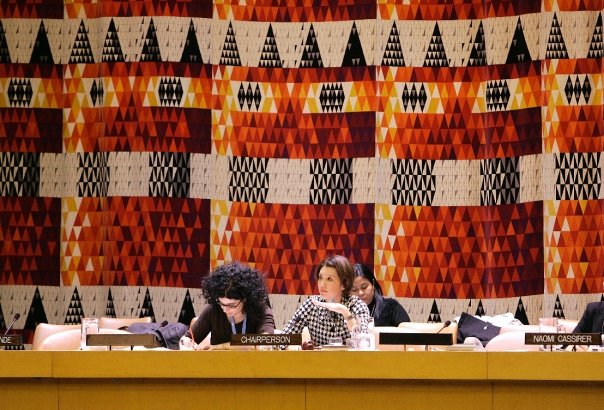
We need to reduce the burden of unpaid work and promote equal sharing of responsibilities between men and women. Historically, women have been the homemakers and care-givers. But today, many women need or want to be part of the work force. This, men need to take on more responsibilities at home.
Many countries have ratified relevant labor conventions. But each country needs to review their national policies and legislation that relates to workers with family responsibilities, that recognize women as part of the labor force, that provide maternity protection, breast feeding support, reasonable hours of work, and so on.
In determining the right policies, we need to emphasis the importance of a gender balanced approach to care-giving (as opposed to focusing on the woman alone) and the need to develop measures to support a more active role of men in care-giving.
There needs to be a change in mind-set. Likewise, action needs to be taken to address gender stereotypes. This begins with education and promoting gender equality and addressing gender stereotypes in school curriculums and grassroots programs.
There also needs to be institutional changes, say in parliaments. We discussed the difficulties faced by women in politics. Parliament was historically a male only profession. Many of its traditions still endure, making it difficult for women to enter or survive (more on this in another blog).
We also noted that during time of economic uncertainty, governments may tend to reduce spending on social services. The consequences of this move would be tremendous. This would put more stress on an already over-burdened health and social services/welfare sector. Without reliable health care and social services, women again will bear the bigger burden “ a burden that will go unrecognized and unprotected.
Back in our respective parliaments, we need to look at the tools at our disposal to bring the value of unpaid care work to the fore. We need to question our national accounts systems, make use of time-use surveys and most importantly, use the national budgetary process to take into account the contribution of unpaid care work and provide support to those who perform it.
As an aside, I note that in the Philippines, there are a lot of families where the man is now the primary home-maker and care-giver. For more reason we need to address gender stereo-types. These stay-at-home dads, need the support and in many cases the training needed to be good home-maker and care-givers.
In conclusion, we need to to reassess how we view women’s unpaid work. We need to put in safeguards and protection for these women (and men). We need to recognize and reward women’s various contributions to the economy and promote a more gender balanced approach to the sharing of responsibilities.
n.b. this is part of a series of articles I am writing in connection with our observation of Womens month and the conferences/meetings I attended in New York.





